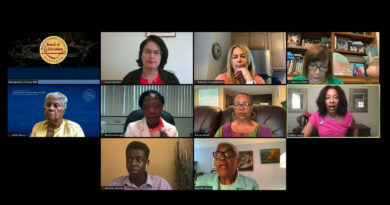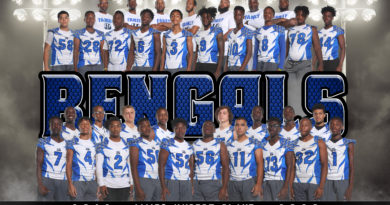Pro/Con: Is Bengal Time Beneficial?
Pro by Alanna Stewart:
Although Bengal Time may not be the most fun thing to go to at the end of the day, it can be beneficial even if it doesn’t seem like it. Bengal Time creates a comfortable atmosphere to be able to talk and speak your mind freely in a small group because of the small homeroom sizes. It’s also a really good debrief for the end of the day. Some may treat it as a free period, but getting to do fun and interactive assignments isn’t too bad, and it helps manage timeliness since most assignments are given to be completed during that class period.
Senior Joshua Mims says, “I think it’s useful because we’re learning about skills that wouldn’t get taught in other classes.”
It’s hard to be comfortable in a homeroom full of people especially because not many people necessarily have their friends in their homeroom, but as time goes on, people will definitely get used to the group. Personally, in my homeroom class we were asked to turn our cameras on when we join and say hello to everyone. This sparks conversations and helps us get to know each other, which makes us more comfortable with each other, and more likely to talk and voice our opinions when needed. Of course, this all depends on the teacher; it’s not always easy for teachers to get every student to turn on their cameras and interact with each other, but encouraging conversation is a great start!
Senior Maame Darkwah appreciates that Bengal Time fosters interaction. “It’s the only way you get to see people in your grade that you don’t see in classes,” she says.
As time has progressed, I’ve definitely noticed that students are more likely to turn on their cameras when they see their peers doing so without being asked—sort of a “lead by example” type of thing. Students are more likely to do something when they don’t feel like they’re being forced or obligated, which then makes it easier for the teachers. This then benefits the students because it not only boosts their communication skills, it helps create new bonds and relationships with people in their class that they may not even have known were there.
Despite the assignments that we’re assigned being ungraded, it still benefits us to go over little things like organizational tips. Writing things out can help us realize a new strategy that we may not have been using before to benefit us, which is especially good because online school is new to everyone so a lot of new strategies have been being put to use while adjusting to this new learning method.
It’s hard to determine if we are gaining anything substantial from Bengal Time because of how early in the school year it is, but learning organizational skills and preparedness has been useful. Of course, only time can tell what the long-term benefits of Bengal Time will be. This period may seem useless, but at the end of the day, it is benefiting us whether we realize it or not. A lot of the lessons being given are lessons we wouldn’t get in a regular class period.
Con by Olivia Gyapong:
Many students feel Bengal Time is largely a waste of time. In a Blake Beat Instagram poll 87 students responded to, 82% of those students said Bengal Time was not useful. One of the problems with Bengal Time is that no one really knows what the purpose is; it’s not clearly defined. Bengal Time has also been used for everything from time management training to community enrichment activities; however, these activities do not require an entire eighth period to complete. There have also been issues every single Bengal Time period with students not being able to access the documents we’re supposed to be working on.
Junior Theo Sodani says, “I didn’t need an hour to talk about time management when I could [have been] doing work.”
Senior Maxine Hsu adds, “What we do doesn’t contribute to our learning much at all and [Bengal Time] is better spent actually working on homework.”
Bengal Time is also purportedly supposed to help students prepare for life after high school, which means homeroom teachers will be disseminating college readiness information during eighth period as well. If sophomores need information on the PSAT, however, a simple email blast and a live reminder from teachers that this important testing date is coming up will suffice. We should not have to sit on an hour-long, mostly silent Zoom, for what could have been a message posted in Canvas—especially if standardized testing cannot be conducted this year.
Senior Jessica Theis says, “It’s very boring and [is] simple information that we could just receive in an email.”
Sometimes, Bengal Time periods don’t even last for the duration they’re supposed to. Depending on the teacher, if students pledge to complete the ungraded busywork, students are released as soon as 30 minutes into class. The Back to School Night activity meant for parents and guardians took all of five minutes to complete, and no one really knew what to do to fill the rest of the time. My homeroom teacher suggested we do any asynchronous work we had for the rest of the block, but there was no structure to be found.
Senior Michael Gersten says this strange and inconsistently-timed, yet mandated eighth period is frustrating. “I work two jobs, am in three AP [classes], and would much rather do things at my own pace instead.”
Students also complain that activities like decorating a virtual Bitmoji locker are beneath them. Thus far, these virtual lockers do not seem to have a purpose other than being a get-to-know-you activity students found pointless and irksome. The activity may be cute and fun for middle schoolers or elementary students, but as some of us are seniors with college applications due in six weeks, the time we spent decorating a virtual locker we may never use again could have been better spent on a productive, constructive activity like writing supplemental essays.
Junior Arthur Jean Pierre says, “I liked the schedule and organization one, but this virtual locker [was] really immature.”
Moreover, no community building has really been done at all. In my homeroom, the vast majority of students leave their cameras off and never speak. Senior Kevin Caldeira says, “From what I’ve seen from seniors, no one really interacts [with each other].”
What is the point if no work is being done, collected, or graded? What is the point if no community is being built? While we are maybe supposed to be on “instructional” Zooms for four hours a day, the Bengal Time period needs to be revised.
If we are supposed to be working on asynchronous work or college readiness tasks, simply call it a study hall period and give those students time to work on what they need to work on in the presence of a teacher should they have questions. Do not make it seem like we have actual work to do during Bengal Time, then give us a five-minute assignment and leave us to stare blankly at dark screens for 55 more.
If we are supposed to be truly making a valiant effort at building community, come up with topics of conversation that will engage students, like how the Black Lives Matter resurgence is affecting teens and making us more politically active and aware. Let’s talk about real, impactful issues. Don’t just leave us to awkwardly discuss which note-taking systems we find most helpful.
Bengal Time does have potential, but sadly and frustratingly, it is not being realized.




